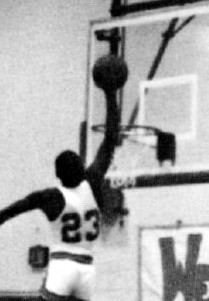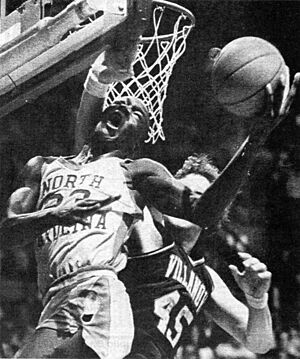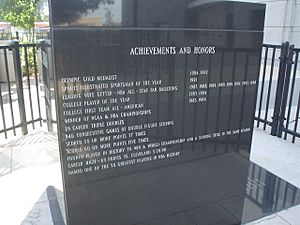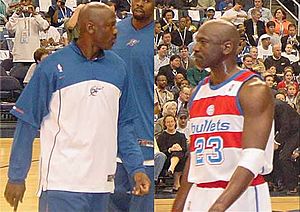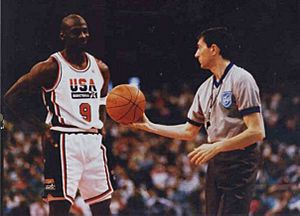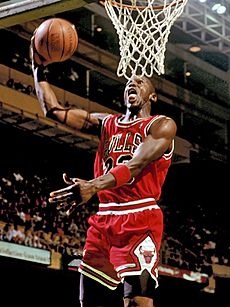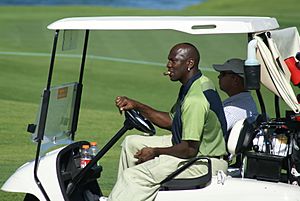Michael Jordan facts for kids
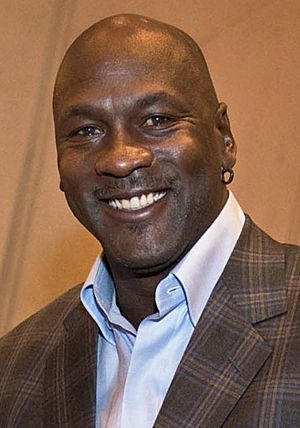
Jordan in 2014
|
|||||||||||||||||||||||||||||
| Charlotte Hornets | |||||||||||||||||||||||||||||
|---|---|---|---|---|---|---|---|---|---|---|---|---|---|---|---|---|---|---|---|---|---|---|---|---|---|---|---|---|---|
| Minority owner | |||||||||||||||||||||||||||||
| Personal information | |||||||||||||||||||||||||||||
| Born | February 17, 1963 Brooklyn, New York, U.S. |
||||||||||||||||||||||||||||
| High school | Emsley A. Laney (Wilmington, North Carolina) |
||||||||||||||||||||||||||||
| Listed height | 6 ft 6 in (1.98 m) | ||||||||||||||||||||||||||||
| Listed weight | 216 lb (98 kg) | ||||||||||||||||||||||||||||
| Career information | |||||||||||||||||||||||||||||
| College | North Carolina (1981–1984) | ||||||||||||||||||||||||||||
| NBA Draft | 1984 / Round: 1 / Pick: 3rd overall | ||||||||||||||||||||||||||||
| Selected by the Chicago Bulls | |||||||||||||||||||||||||||||
| Pro career | 1984–1993, 1995–1998, 2001–2003 | ||||||||||||||||||||||||||||
| League | NBA | ||||||||||||||||||||||||||||
| Career history | |||||||||||||||||||||||||||||
| 1984–1993, 1995–1998 |
Chicago Bulls | ||||||||||||||||||||||||||||
| 2001–2003 | Washington Wizards | ||||||||||||||||||||||||||||
| Career highlights and awards | |||||||||||||||||||||||||||||
|
|||||||||||||||||||||||||||||
| Career NBA statistics | |||||||||||||||||||||||||||||
| Points | 32,292 (30.1 ppg) | ||||||||||||||||||||||||||||
| Rebounds | 6,672 (6.2 rpg) | ||||||||||||||||||||||||||||
| Assists | 5,633 (5.3 apg) | ||||||||||||||||||||||||||||
|
Medals
|
|||||||||||||||||||||||||||||
Michael Jeffrey Jordan (born February 17, 1963), also known as MJ, is an American businessman and former professional basketball player. He is currently a part-owner of the Charlotte Hornets in the National Basketball Association (NBA). Jordan played 15 seasons in the NBA from 1984 to 2003. He won six NBA championships with the Chicago Bulls. Many people consider him one of the greatest basketball players ever. He helped make basketball and the NBA popular worldwide in the 1980s and 1990s. He became a global cultural icon.
Jordan played college basketball for the North Carolina Tar Heels. In 1982, as a freshman, he was part of the team that won the national championship. Jordan joined the Bulls in 1984 as the third player picked in the NBA draft. He quickly became a star, scoring many points and playing great defense. His amazing jumping skills, especially his slam dunks from the free-throw line, earned him the nicknames "Air Jordan" and "His Airness".
Jordan won his first NBA title with the Bulls in 1991. He then won two more in 1992 and 1993, completing a "three-peat" (three championships in a row). He retired from basketball before the 1993–94 season. He said he was tired from playing basketball and being so famous. He then played Minor League Baseball for a short time.
Jordan returned to the Bulls in March 1995. He led them to three more championships in 1996, 1997, and 1998. In the 1995–96 season, the Bulls set a record with 72 regular season wins. Jordan retired for a second time in January 1999. He came back again for two more NBA seasons from 2001 to 2003, playing for the Washington Wizards.
During his college and NBA careers, Jordan played for the United States men's national basketball team. He won four gold medals. These included medals at the 1983 Pan American Games, 1984 Summer Olympics, 1992 Tournament of the Americas, and 1992 Summer Olympics. His national team was undefeated in all these tournaments.
Jordan's many awards include six NBA Finals Most Valuable Player (MVP) awards. He also won ten NBA scoring titles, which is an all-time record. He earned five NBA MVP awards and was named to the All-NBA First Team ten times. He also received nine All-Defensive First Team honors. Jordan was selected for the NBA All-Star Game fourteen times. He won the NBA All-Star Game MVP award three times. He also led the league in steals three times and won the 1988 NBA Defensive Player of the Year Award.
He holds NBA records for the highest career regular season scoring average (30.1 points per game) and playoff scoring average (33.4 points per game). In 1999, ESPN named Jordan the greatest North American athlete of the 20th century. He was also second only to Babe Ruth on the Associated Press' list of athletes of the century. Jordan was inducted into the Naismith Memorial Basketball Hall of Fame twice. Once in 2009 for his own career, and again in 2010 as part of the 1992 U.S. Olympic team, known as "The Dream Team." The trophy for the NBA Most Valuable Player Award is now named in his honor.
Jordan was one of the most successful athletes in marketing. He helped make Nike's Air Jordan sneakers very popular. These shoes were first released in 1984 and are still well-liked today. Jordan played himself in the movie Space Jam (1996). He was also the main focus of the documentary series The Last Dance (2020).
In 2006, he became a part-owner and head of basketball operations for the Charlotte Hornets (then called the Bobcats). In 2010, he bought a controlling share of the team. He sold his majority stake in 2023. Jordan is also a co-owner of 23XI Racing in the NASCAR Cup Series. In 2014, he became the first NBA player to become a billionaire. In 2016, President Barack Obama gave Jordan the Presidential Medal of Freedom. As of 2025, his net worth is estimated at $3.8 billion, making him one of the richest African-Americans and richest celebrities.
Contents
- Early Life and High School
- College Basketball Career
- Professional Basketball Journey
- Washington Wizards Years
- National Team Career
- How Jordan Played Basketball
- Michael Jordan's Legacy
- Post-Retirement Activities
- Personal Life
- Film and Books
- NBA Career Statistics
- Awards and Honors
- Interesting Facts About Michael Jordan
- Michael Jordan's Famous Quotes
- See also
Early Life and High School
Michael Jeffrey Jordan was born in Brooklyn, New York, on February 17, 1963. His parents were Deloris and James R. Jordan Sr.. He had two older brothers, James Jr. and Larry, and two sisters, Deloris and Roslyn. The family moved to Wilmington, North Carolina, in 1968.
Jordan went to Emsley A. Laney High School. He played basketball, baseball, and football there. In his sophomore year, he tried out for the basketball varsity team. But at 5 feet 11 inches tall, he was considered too short. This motivated Jordan to work harder. He became the star of Laney's junior varsity team, scoring many points.
The next summer, he grew 4 inches and trained very hard. He earned a spot on the varsity team. Jordan averaged over 25 points per game in his last two high school seasons. He also started wearing his famous jersey number, 23. As a senior, he played in the 1981 McDonald's All-American Game. He scored 30 points in that game. For the season, he averaged 26.8 points, 11.6 rebounds, and 10.1 assists per game.
Many colleges wanted Jordan to play basketball for them. These included Duke, North Carolina, and Syracuse. In 1981, he accepted a basketball scholarship to the University of North Carolina at Chapel Hill. He studied cultural geography there. He was interested in becoming a meteorologist.
College Basketball Career
As a freshman, Jordan played for coach Dean Smith. He was named ACC Freshman of the Year. He averaged 13.4 points per game. In 1982, he made the game-winning shot in the NCAA Championship game. This was against Georgetown, led by future NBA star Patrick Ewing. Jordan later said this shot was a major turning point in his career.
During his second and third years, Jordan was one of the best players in the ACC. He was always among the top scorers. In his three seasons with the Tar Heels, Jordan averaged 17.7 points per game. He also had 5.0 rebounds and 1.8 assists per game.
Jordan was chosen for the NCAA All-American First Team in 1983 and 1984. After winning top college player awards in 1984, Jordan left North Carolina early. He entered the 1984 NBA draft. He returned to North Carolina in 1986 to finish his degree in geography. In 2002, he was named the greatest athlete in ACC history.
Professional Basketball Journey
Chicago Bulls: Early Years
The Chicago Bulls picked Jordan third overall in the 1984 NBA draft. Two other teams picked centers before him. Some thought Jordan was not picked sooner because Portland already had a guard like him. Jordan made his NBA debut on October 26, 1984. He scored 16 points in that game.
In his first season (1984–85), Jordan averaged 28.2 points per game. He helped the Bulls improve their record and reach the playoffs. He quickly became a fan favorite. Fans voted him an All-Star starter in his rookie year. He won the NBA Rookie of the Year award. The Bulls lost in the first round of the playoffs that year.
In 1985, Jordan famously shattered a backboard with a dunk in an exhibition game. His 1985–86 season was cut short by a broken foot. But the Bulls still made the playoffs. Jordan returned for the postseason. In a game against the Boston Celtics, he scored a playoff-record 63 points. However, the Celtics swept the series.
Jordan fully recovered for the 1986–87 season. He had an amazing scoring year, averaging 37.1 points per game. He also showed his defensive skills. He became the first player to record 200 steals and 100 blocks in a season. Despite his success, Magic Johnson won the MVP award. The Bulls again lost to the Celtics in the playoffs.
Facing the Pistons Challenge
In the 1987–88 season, Jordan led the league in scoring with 35.0 points per game. He won his first MVP Award. He was also named NBA Defensive Player of the Year. The Bulls won 50 games and made it past the first round of the playoffs. But they lost to the Detroit Pistons, known as the "Bad Boys," in the Eastern Conference Semifinals.
In the 1988–89 season, Jordan again led the league in scoring. He averaged 32.5 points, 8.0 rebounds, and 8.0 assists per game. He even played as a point guard for a while, getting 10 triple-doubles in 11 games. The Bulls reached the Eastern Conference Finals. They beat the Cavaliers and Knicks along the way. Jordan made a famous game-winning shot over Craig Ehlo, known as "The Shot". But the Pistons again defeated the Bulls, using their "Jordan Rules" defense to stop him.
The Bulls improved in the 1989–90 season. With new coach Phil Jackson and young stars like Scottie Pippen and Horace Grant, they won 55 games. Jordan scored a career-high 69 points in one game. They reached the Eastern Conference Finals again. But for the third year in a row, the Pistons beat them.
First Three NBA Championships
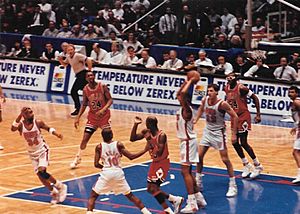
After losing to the Pistons, coach Phil Jackson introduced the "triangle offense." This system helped the team work together better. Jordan was hesitant at first but eventually embraced it.
In the 1990–91 season, Jordan won his second MVP award. He averaged 31.5 points per game. The Bulls set a team record with 61 wins. With Pippen becoming an All-Star, the Bulls were stronger. They swept the Detroit Pistons in the Eastern Conference Finals.
The Bulls reached the NBA Finals for the first time in team history. They faced the Los Angeles Lakers. The Bulls won the series in five games. Jordan won his first NBA Finals MVP award. He cried while holding the trophy.
Jordan and the Bulls continued to dominate in the 1991–92 season. They set another record with 67 wins. Jordan won his second straight MVP award. After tough playoff series, the Bulls met the Portland Trail Blazers in the Finals. In Game 1, Jordan scored a Finals-record 35 points in the first half. He made six three-pointers and famously shrugged, as if saying, "I can't believe I'm doing this." The Bulls won the series in six games. Jordan was named Finals MVP for the second time.
In the 1992–93 season, Jordan averaged 32.6 points per game. He lost the MVP award to his friend Charles Barkley. Jordan and the Bulls faced Barkley's Phoenix Suns in the 1993 NBA Finals. The Bulls won their third NBA championship. Jordan averaged a Finals-record 41.0 points per game. He became the first player to win three straight Finals MVP awards. After this win, Jordan felt tired from his huge fame and all the attention.
First Retirement and Baseball
| Michael Jordan | |||
|---|---|---|---|
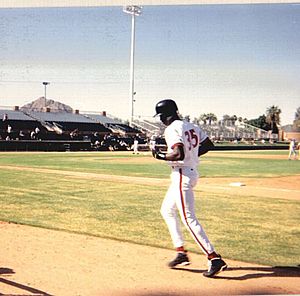
Jordan in training with the Scottsdale Scorpions in 1994
|
|||
| Birmingham Barons – No. 45, 35 | |||
| Outfielder | |||
|
|||
| Professional debut | |||
| Southern League: April 8, 1994, for the Birmingham Barons | |||
| Arizona Fall League: 1994, for the Scottsdale Scorpions | |||
| Last appearance | |||
| March 10, 1995, for the Birmingham Barons | |||
| Southern League statistics (through 1994) |
|||
| Batting average | .202 | ||
| Home runs | 3 | ||
| Runs batted in | 51 | ||
| Arizona Fall League statistics | |||
| Batting average | .252 | ||
| Runs batted in | 8 | ||
| Teams | |||
|
|||
On October 6, 1993, Jordan announced he was retiring from basketball. He said he had lost his desire to play. He later explained that his father's death three months earlier influenced his decision. Jordan was very close to his father. He even copied his father's habit of sticking out his tongue while working. Jordan later made this his signature move on the court.
Jordan surprised everyone by signing a Minor League Baseball contract in February 1994. He wanted to pursue his late father's dream of him playing Major League Baseball. He played for the Birmingham Barons, a minor league team. In 1994, he batted .202 with 3 home runs and 51 runs batted in. His jersey number 23 was retired by the Bulls in November 1994.
Return to the NBA
The Bulls did well without Jordan in 1993–94 but lost in the playoffs. In March 1995, Jordan decided to leave baseball. He announced his return to the NBA with two words: "I'm back." The next day, he played for the Bulls against the Indiana Pacers, scoring 19 points. He wore number 45, his baseball number.
Jordan played well despite his time away. He made a game-winning shot in his fourth game back. He then scored 55 points against the New York Knicks. The Bulls made the playoffs. They faced the Orlando Magic. After Game 1, an Orlando player said Jordan "didn't look like the old Michael Jordan." Jordan responded by scoring 38 points in the next game. He also switched back to his famous number 23. The Bulls lost the series to Orlando in six games.
Second Three NBA Championships
Jordan was motivated by the playoff loss. He trained hard for the 1995–96 season. The Bulls added rebound specialist Dennis Rodman. The team dominated the league, finishing with a record of 72 wins and 10 losses. This was the best regular season record in NBA history at the time. Jordan led the league in scoring with 30.4 points per game. He won the regular season MVP and All-Star Game MVP awards.
In the playoffs, the Bulls lost only three games. They defeated the Seattle SuperSonics 4–2 in the 1996 NBA Finals to win their fourth championship. Jordan was named Finals MVP for a record fourth time. After winning, Jordan became emotional, crying while holding the game ball. This was his first championship since his father's death.
In the 1996–97 season, the Bulls almost had another 70-win season. They reached the NBA Finals again, facing the Utah Jazz. The Jazz's Karl Malone had beaten Jordan for the NBA MVP award. The series had memorable moments. Jordan won Game 1 with a buzzer-beating shot. In Game 5, known as "The Flu Game", Jordan played despite being sick. He scored 38 points, including the game-winning shot. The Bulls won the series in six games. Jordan received his fifth Finals MVP award.
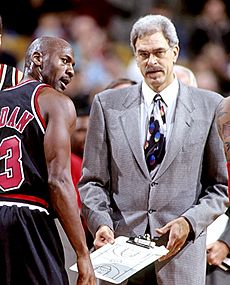
The Bulls had a 62–20 record in the 1997–98 season. Jordan led the league in scoring with 28.7 points per game. He won his fifth regular season MVP award. The Bulls won the Eastern Conference Championship again. They had a tough seven-game series against the Indiana Pacers. They then faced the Utah Jazz in the Finals again.
In Game 6 of the 1998 NBA Finals, the Bulls led the series 3–2. With seconds left, Jordan made a series of incredible plays. He stole the ball from Karl Malone. Then, with 5.2 seconds left, Jordan made a game-winning shot over Bryon Russell. This gave Chicago an 87–86 lead. The Bulls won their sixth NBA championship, completing a second "three-peat." Jordan was voted Finals MVP for a record sixth time. He averaged 33.5 points per game in the series, including 45 in the final game.
Second and Final Retirement
Jordan retired for the second time on January 13, 1999. His coach, Phil Jackson, was leaving, and other key players were also expected to depart. On January 19, 2000, Jordan returned to the NBA as a part-owner and president of basketball operations for the Washington Wizards. He was in charge of all basketball decisions for the team.
Despite saying he was "99.9% certain" he would never play again, Jordan wanted to make another comeback in 2001. He trained hard and hired his old Bulls coach, Doug Collins, to coach the Wizards.
Washington Wizards Years
On September 25, 2001, Jordan announced he would play for the Washington Wizards. He said he would donate his salary to help victims of the September 11 attacks. In the 2001–02 season, Jordan led the team in scoring (22.9 ppg), assists (5.2 apg), and steals (1.4 spg). He played only 60 games due to a knee injury. The Wizards missed the playoffs, but their record improved by 18 wins.
In his 14th and final NBA All-Star Game in 2003, Jordan passed Kareem Abdul-Jabbar as the all-time leading scorer in All-Star Game history. He played all 82 games in the 2002–03 season. Jordan averaged 20.0 points, 6.1 rebounds, and 3.8 assists per game. Even at 40 years old, he scored 20 or more points 42 times. On February 21, 2003, he became the first 40-year-old to score 43 points in an NBA game.
During his time with the Wizards, all their home games were sold out. The Wizards were the second most-watched team in the NBA. Jordan's final two seasons did not lead to playoff appearances. He sometimes criticized his teammates for their lack of focus.
Final Retirement
The 2002–03 season was Jordan's last. Tributes were paid to him across the NBA. In his final game in Chicago, he received a four-minute standing ovation. The Miami Heat even retired his number 23 jersey, even though he never played for them.
Jordan played his final NBA game on April 16, 2003, in Philadelphia. He scored 13 points. In the fourth quarter, the crowd chanted "We want Mike!" He returned to the game for a short time. He made two free throws. He then received a three-minute standing ovation from everyone in the arena.
National Team Career
Jordan first played for the U.S. national basketball team as a college player in 1983. He led the team in scoring and won a gold medal at the Pan American Games. The next year, he won another gold medal at the 1984 Summer Olympics. Jordan led the 1984 U.S. team in scoring.
In 1992, Jordan was part of the famous "Dream Team". This team included other legends like Larry Bird and Magic Johnson. The Dream Team won two gold medals: one at the 1992 Tournament of the Americas and another at the 1992 Summer Olympics. Jordan started all eight games in the Olympics. He averaged 14.9 points per game. Jordan was undefeated in all four tournaments he played for the United States. He won all 30 games he took part in.
How Jordan Played Basketball
Jordan was a shooting guard but could also play small forward. He was known for performing well in important moments. With the Bulls, he decided 25 games with shots or free throws in the last 30 seconds. This included two NBA Finals games. His strong desire to win was clear in his "trash talk" and hard work. Jordan often used small insults to motivate himself.
He was a very tough player. He rarely missed games due to injury. From 1986–87 to 2001–02, he played almost every game. He played all 82 regular season games nine times. Jordan often mentioned David Thompson and Jerry West as players who influenced him.
Jordan had many ways to score. He could drive strongly to the basket and draw fouls. He also developed a famous fadeaway jump shot. This move made him almost impossible to stop. As his career went on, he gained weight to handle the physical play of the 1990s. Even though some criticized him early on for being selfish, Jordan was willing to pass the ball. He averaged 5.3 assists per game in his career. He was also a good rebounder for a guard, averaging 6.2 rebounds per game. Defensively, he averaged 2.3 steals and 0.8 blocks per game.
Three-point shooting was not Jordan's main strength early on. But he improved it later in his career. He finished his career shooting 32% from three-point range. His best years were 1989–90 and 1992–93.
In 1988, Jordan won both the NBA Defensive Player of the Year and MVP awards. No other NBA player had won both before. He set records for blocked shots by a guard. He also had many steals, making him a great defensive player. Jordan ranks fourth in NBA history in total steals with 2,514. Many people, including Doc Rivers, called Jordan "the best superstar defender in the history of the game."
Michael Jordan's Legacy
Jordan's talent was clear from his first NBA season. By November 1984, people were comparing him to Julius Erving. Larry Bird said rookie Jordan was the best player he had ever seen. After Jordan scored 63 points in a playoff game in 1986, Bird famously said he was "God disguised as Michael Jordan."
Jordan led the NBA in scoring for 10 seasons, an NBA record. He also tied Wilt Chamberlain's record of seven straight scoring titles. Jordan was named to the NBA All-Defensive First Team nine times, an NBA record shared with others. He holds the highest career regular season (30.1 ppg) and playoff (33.4 ppg) scoring averages. By 1998, he was known for performing well in clutch moments. He often asked for the ball when games were close.
Jordan's 5,987 points in the playoffs are the second-highest ever. He scored 32,292 points in the regular season, placing him fifth on the NBA all-time scoring list. With five regular season MVPs, six Finals MVPs (an NBA record), and three All-Star Game MVPs, Jordan is one of the most awarded players in NBA history. He was named one of the 50 Greatest Players in NBA History in 1996. He was also selected to the NBA 75th Anniversary Team in 2021.
Jordan is one of only eight players to achieve the "basketball Triple Crown." This means winning an NCAA championship, an NBA championship, and an Olympic gold medal. He did this twice. Since 1976, Jordan and Scottie Pippen are the only two players to win six NBA Finals playing for one team. Fans voted Jordan the most All-Star votes nine times.
Many of Jordan's peers say he is the greatest basketball player of all time. In 1999, an ESPN survey ranked Jordan the greatest North American athlete of the 20th century. He has appeared on the cover of Sports Illustrated a record 50 times.
Jordan's amazing jumping ability, shown in his Slam Dunk Contest wins, inspired many young players. Several NBA players, like LeBron James and Dwyane Wade, said Jordan was their role model. Many new players entering the NBA were called "the next Michael Jordan." His jersey number, 23, became iconic. Many players wear it to honor him.
Jordan greatly increased the popularity of basketball. TV ratings for the NBA grew during his time. The popularity of the NBA in the U.S. declined after his last title. In August 2009, the Naismith Memorial Basketball Hall of Fame opened a Michael Jordan exhibit. In 2016, President Barack Obama gave Jordan the Presidential Medal of Freedom. In September 2022, Jordan's jersey from the 1998 NBA Finals sold for $10.1 million. This made it the most expensive game-worn sports item ever. In December 2022, the NBA named its new MVP trophy the "Michael Jordan Trophy."
Post-Retirement Activities
After his third retirement, Jordan expected to return to his front office role with the Wizards. However, the Wizards' owner fired him in May 2003. Jordan said he felt betrayed.
For several years, Jordan played golf in charity tournaments. He also spent time with his family. He promoted his Jordan Brand clothing line. Since 2004, Jordan has owned Michael Jordan Motorsports, a professional motorcycle racing team.
Charlotte Hornets Ownership
In June 2006, Jordan bought a small share in the Charlotte Bobcats (now the Charlotte Hornets). He became the team's second-largest owner. He also took full control of the team's basketball operations. In February 2010, Jordan sought to become the main owner of the Bobcats. In March 2010, the NBA approved his purchase. This made him the first former player to be the majority owner of an NBA team.
During the 2011 NBA lockout, Jordan was part of a group of owners who wanted to limit players' salaries. Some criticized him for this, saying he was going against the players who made him famous. In the 2011–12 season, the Bobcats had a very bad record of 7 wins and 59 losses. This was the worst winning percentage in NBA history. Jordan said he was "very, very frustrating" about this record.
In 2019, Jordan sold a small part of his ownership in the Hornets. He kept the majority share and his role as chairman. In 2023, Jordan sold his majority stake in the team. This ended his 13 years as the main owner. He kept a small share in the team. The sale was completed in August 2023 for about $3 billion.
23XI Racing
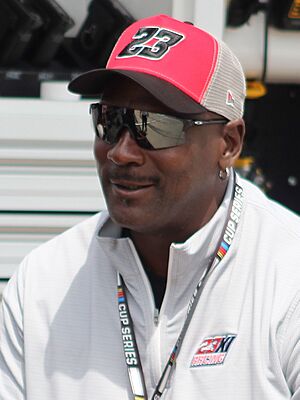
In September 2020, Jordan and NASCAR driver Denny Hamlin announced they would start a NASCAR Cup Series team. The team, named 23XI Racing, began competing in 2021. Their car number is 23. The team added a second car with number 45 in 2022. In 2024, one of their drivers, Tyler Reddick, won the regular season championship.
Personal Life
Family
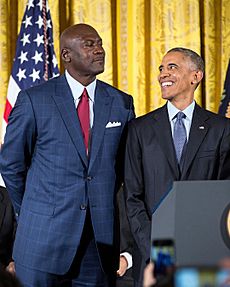
Jordan married Juanita Vanoy on September 2, 1989. They had three children: Jeffrey, Marcus, and Jasmine. They divorced in December 2006.
Jordan bought land in Highland Park, Illinois, in 1991. He built a large mansion there, which was finished in 1995. He also owns homes in North Carolina and Florida.
Jordan proposed to his longtime girlfriend, Yvette Prieto, in 2011. They married on April 27, 2013. On February 11, 2014, Yvette gave birth to twin daughters, Victoria and Ysabel. In 2019, Jordan became a grandfather when his daughter Jasmine had a son.
Business and Endorsements
Jordan is one of the most famous sports figures for marketing. He has been a spokesperson for many big brands. These include Nike, Coca-Cola, Gatorade, and McDonald's. Nike created his signature shoe, the Air Jordan, in 1984. These shoes became very popular. Nike later created a separate division called the "Jordan Brand."
Jordan also appeared with the Looney Tunes characters. A Nike commercial with Jordan and Bugs Bunny led to the 1996 movie Space Jam. Jordan starred as himself in the film.
Since 2008, Jordan's yearly income from endorsements has been over $40 million. The Jordan Brand brings in over $1 billion in sales for Nike. In June 2014, Jordan became the first NBA player to be a billionaire. As of 2025, his net worth is estimated at $3.5 billion.
Jordan co-owns an automotive group. He also has interests in the restaurant industry. He is the main investor in a golf course in Florida. In September 2020, Jordan became an investor and advisor for DraftKings.
Giving Back
From 2001 to 2014, Jordan hosted a golf tournament. It raised money for different charities. In 2006, Jordan and his former wife Juanita gave $5 million to a high school in Chicago. The Jordan Brand has also donated to Habitat for Humanity and Boys & Girls Clubs.
The Make-A-Wish Foundation named Jordan its Chief Wish Ambassador in 2008. By 2019, Jordan had raised over $5 million for the organization. In 2023, he donated $10 million to Make-A-Wish for his 60th birthday.
In 2015, Jordan donated money from a lawsuit to 23 different Chicago charities. In 2017, he gave $7 million to fund two Novant Health Michael Jordan Family Clinics in Charlotte, North Carolina. After Hurricane Florence in 2018, Jordan donated $2 million for relief efforts. He also gave $1 million to help the Bahamas after Hurricane Dorian in 2019.
In 2016, Jordan donated $1 million each to the NAACP Legal Defense Fund and the Institute for Community-Police Relations. He said he wanted to "build trust and respect between communities and law enforcement." In June 2020, Jordan and his brand announced they would donate $100 million over 10 years. This money would go to organizations working for racial equality and social justice. In 2021, Jordan funded two more clinics in North Carolina with a $10 million donation. In 2024, he funded another clinic in Wilmington.
Film and Books
Jordan played himself in the 1996 comedy film Space Jam. The movie was a box office success, earning $230 million worldwide. It also made over $1 billion from merchandise.
In 2000, an IMAX documentary called Michael Jordan to the Max focused on his career with the Chicago Bulls. Two decades later, the Emmy Award-winning 10-part TV documentary The Last Dance covered the same period in more detail. This series used hours of unseen footage from the 1997–98 NBA season.
Jordan has also written several books about his life and basketball career. These include Rare Air: Michael on Michael (1993) and For the Love of the Game: My Story (1998).
NBA Career Statistics
| Legend | |||||
|---|---|---|---|---|---|
| GP | Games played | GS | Games started | MPG | Minutes per game |
| FG% | Field goal percentage | 3P% | 3-point field goal percentage | FT% | Free throw percentage |
| RPG | Rebounds per game | APG | Assists per game | SPG | Steals per game |
| BPG | Blocks per game | PPG | Points per game | Bold | Career high |
Regular Season Stats
| Year | Team | GP | GS | MPG | FG% | 3P% | FT% | RPG | APG | SPG | BPG | PPG |
|---|---|---|---|---|---|---|---|---|---|---|---|---|
| 1984–85 | Chicago | 82* | 82* | 38.3 | .515 | .173 | .845 | 6.5 | 5.9 | 2.4 | .8 | 28.2 |
| 1985–86 | Chicago | 18 | 7 | 25.1 | .457 | .167 | .840 | 3.6 | 2.9 | 2.1 | 1.2 | 22.7 |
| 1986–87 | Chicago | 82* | 82* | 40.0 | .482 | .182 | .857 | 5.2 | 4.6 | 2.9 | 1.5 | 37.1* |
| 1987–88 | Chicago | 82 | 82* | 40.4* | .535 | .132 | .841 | 5.5 | 5.9 | 3.2* | 1.6 | 35.0* |
| 1988–89 | Chicago | 81 | 81 | 40.2* | .538 | .276 | .850 | 8.0 | 8.0 | 2.9 | .8 | 32.5* |
| 1989–90 | Chicago | 82* | 82* | 39.0 | .526 | .376 | .848 | 6.9 | 6.3 | 2.8* | .7 | 33.6* |
| 1990–91† | Chicago | 82* | 82* | 37.0 | .539 | .312 | .851 | 6.0 | 5.5 | 2.7 | 1.0 | 31.5* |
| 1991–92† | Chicago | 80 | 80 | 38.8 | .519 | .270 | .832 | 6.4 | 6.1 | 2.3 | .9 | 30.1* |
| 1992–93† | Chicago | 78 | 78 | 39.3 | .495 | .352 | .837 | 6.7 | 5.5 | 2.8* | .8 | 32.6* |
| 1994–95 | Chicago | 17 | 17 | 39.3 | .411 | .500 | .801 | 6.9 | 5.3 | 1.8 | .8 | 26.9 |
| 1995–96† | Chicago | 82 | 82* | 37.7 | .495 | .427 | .834 | 6.6 | 4.3 | 2.2 | .5 | 30.4* |
| 1996–97† | Chicago | 82 | 82* | 37.9 | .486 | .374 | .833 | 5.9 | 4.3 | 1.7 | .5 | 29.6* |
| 1997–98† | Chicago | 82* | 82* | 38.8 | .465 | .238 | .784 | 5.8 | 3.5 | 1.7 | .5 | 28.7* |
| 2001–02 | Washington | 60 | 53 | 34.9 | .416 | .189 | .790 | 5.7 | 5.2 | 1.4 | .4 | 22.9 |
| 2002–03 | Washington | 82 | 67 | 37.0 | .445 | .291 | .821 | 6.1 | 3.8 | 1.5 | .5 | 20.0 |
| Career | 1,072 | 1,039 | 38.3 | .497 | .327 | .835 | 6.2 | 5.3 | 2.3 | .8 | 30.1 |
|
| All-Star | 13 | 13 | 29.4 | .472 | .273 | .750 | 4.7 | 4.2 | 2.8 | .5 | 20.2 | |
Playoff Stats
| Year | Team | GP | GS | MPG | FG% | 3P% | FT% | RPG | APG | SPG | BPG | PPG |
|---|---|---|---|---|---|---|---|---|---|---|---|---|
| 1985 | Chicago | 4 | 4 | 42.8 | .436 | .125 | .828 | 5.8 | 8.5 | 2.8 | 1.0 | 29.3 |
| 1986 | Chicago | 3 | 3 | 45.0 | .505 | 1.000 | .872 | 6.3 | 5.7 | 2.3 | 1.3 | 43.7 |
| 1987 | Chicago | 3 | 3 | 42.7 | .417 | .400 | .897 | 7.0 | 6.0 | 2.0 | 2.3 | 35.7 |
| 1988 | Chicago | 10 | 10 | 42.7 | .531 | .333 | .869 | 7.1 | 4.7 | 2.4 | 1.1 | 36.3 |
| 1989 | Chicago | 17 | 17 | 42.2 | .510 | .286 | .799 | 7.0 | 7.6 | 2.5 | .8 | 34.8 |
| 1990 | Chicago | 16 | 16 | 42.1 | .514 | .320 | .836 | 7.2 | 6.8 | 2.8 | .9 | 36.7 |
| 1991† | Chicago | 17 | 17 | 40.5 | .524 | .385 | .845 | 6.4 | 8.4 | 2.4 | 1.4 | 31.1 |
| 1992† | Chicago | 22 | 22 | 41.8 | .499 | .386 | .857 | 6.2 | 5.8 | 2.0 | .7 | 34.5 |
| 1993† | Chicago | 19 | 19 | 41.2 | .475 | .389 | .805 | 6.7 | 6.0 | 2.1 | .9 | 35.1 |
| 1995 | Chicago | 10 | 10 | 42.0 | .484 | .367 | .810 | 6.5 | 4.5 | 2.3 | 1.4 | 31.5 |
| 1996† | Chicago | 18 | 18 | 40.7 | .459 | .403 | .818 | 4.9 | 4.1 | 1.8 | .3 | 30.7 |
| 1997† | Chicago | 19 | 19 | 42.3 | .456 | .194 | .831 | 7.9 | 4.8 | 1.6 | .9 | 31.1 |
| 1998† | Chicago | 21 | 21 | 41.5 | .462 | .302 | .812 | 5.1 | 3.5 | 1.5 | .6 | 32.4 |
| Career | 179 | 179 | 41.8 | .487 | .332 | .828 | 6.4 | 5.7 | 2.1 | .8 | 33.4 |
|
Awards and Honors
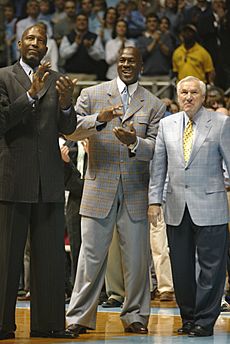
NBA
- Six-time NBA champion – 1991, 1992, 1993, 1996, 1997, 1998
- Six-time NBA Finals MVP – 1991, 1992, 1993, 1996, 1997, 1998
- Five-time NBA MVP – 1988, 1991, 1992, 1996, 1998
- NBA Defensive Player of the Year – 1988
- NBA Rookie of the Year – 1985
- 10-time NBA scoring leader – 1987–1993, 1996–1998
- Three-time NBA steals leader – 1988, 1990, 1993
- 14-time NBA All-Star – 1985–1993, 1996–1998, 2002, 2003
- Three-time NBA All-Star Game MVP – 1988, 1996, 1998
- 10-time All-NBA First Team – 1987–1993, 1996–1998
- One-time All-NBA Second Team – 1985
- Nine-time NBA All-Defensive First Team – 1988–1993, 1996–1998
- NBA All-Rookie First Team – 1985
- Two-time NBA Slam Dunk Contest champion – 1987, 1988
- Two-time IBM Award winner – 1985, 1989
- Named one of the 50 Greatest Players in NBA History in 1996
- Selected on the NBA 75th Anniversary Team in 2021
- No. 23 retired by the Chicago Bulls
- No. 23 retired by the Miami Heat
- Chicago Bulls Ring of Honor
- NBA MVP trophy renamed in Jordan's honor ("Michael Jordan Trophy") in 2022
- McDonald's Championship – 1997
- McDonald's Championship MVP – 1997
USA Basketball
- Two-time Olympic gold medal winner – 1984, 1992
- Tournament of the Americas gold medal winner – 1992
- Pan American Games gold medal winner – 1983
- Pan American Games Most Outstanding Player – 1983
- Three-time USA Basketball Male Athlete of the Year – 1983, 1984, 1992
NCAA
- NCAA national championship – 1982
- ACC Rookie of the Year – 1982
- Two-time Consensus NCAA All-American First Team – 1983, 1984
- ACC Men's Basketball Player of the Year – 1984
- ACC Athlete of the Year – 1984
- Two-time Sporting News National Player of the Year – 1983, 1984
- AP College Player of the Year – 1984
- USBWA College Player of the Year – 1984
- Naismith College Player of the Year – 1984
- Adolph Rupp Trophy – 1984
- John R. Wooden Award – 1984
- UPI College Player of the Year – 1984
- NABC Player of the Year – 1984
- No. 23 retired by the North Carolina Tar Heels
High School
- McDonald's All-American – 1981
- Parade All-American First Team – 1981
Halls of Fame
- Two-time Naismith Memorial Basketball Hall of Fame inductee:
- Class of 2009 – individual
- Class of 2010 – as a member of the "Dream Team"
- United States Olympic Hall of Fame – Class of 2009 (as a member of the "Dream Team")
- North Carolina Sports Hall of Fame – Class of 2010
- Two-time FIBA Hall of Fame inductee:
- Class of 2015 – individual
- Class of 2017 – as a member of the "Dream Team"
Media
- Three-time Associated Press Athlete of the Year – 1991, 1992, 1993
- Sports Illustrated Sportsperson of the Year – 1991
- Sporting News Athlete of the Year – 1991
- Seven-time Sporting News NBA MVP – 1988, 1989, 1991, 1992, 1996, 1997, 1998
- Ranked No. 1 by Slam magazine's "Top 50 Players of All-Time"
- Ranked No. 1 by ESPN SportsCentury's "Top North American Athletes of the 20th Century"
- 10-time ESPY Award winner (in various categories)
- 1997 Marca Leyenda winner
National
State/Local
- Statue inside the United Center
- Section of Madison Street in Chicago renamed Michael Jordan Drive – 1994
Interesting Facts About Michael Jordan
- Jordan has a fear of large bodies of water because he almost drowned at age 11.
- His childhood hero was basketball legend Magic Johnson.
- If Jordan hadn't played in the NBA, his backup plan was to become a weatherman. He studied cultural geography in college.
- He initially wanted to wear Adidas shoes when he joined the NBA. However, Nike offered him more money to endorse their brand.
- In 2020, it was revealed that Jordan had made over $1 billion from his partnership with Nike.
- In 1991, he turned down an invitation from President George H.W. Bush to visit the White House. He chose to play golf instead.
- Before every game, Michael Jordan had a ritual. Four hours before the match, he would eat the same meal: a 23-ounce New York steak, mashed potatoes, a salad, and ginger ale.
- He is the only professional basketball player over age 40 to average 20 points per game (PPG).
- ESPN ranked Michael Jordan as the greatest North American athlete of the 20th century.
- The highest bid for a Jordan sneaker at an auction was $71,000.
Michael Jordan's Famous Quotes
- "The key to success is failure."
- "Failure makes me work even harder."
- "If you do the work, you get rewarded. There are no shortcuts in life."
- "Heart is what separates the good from the great."
- "If you quit once, it becomes a habit. Never quit!"
See also
 In Spanish: Michael Jordan para niños
In Spanish: Michael Jordan para niños
 | William L. Dawson |
 | W. E. B. Du Bois |
 | Harry Belafonte |


